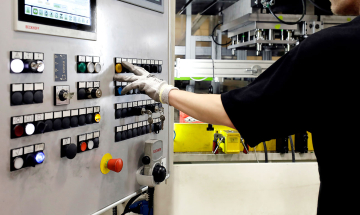
Technology Industries of Finland Messages for the EU Elections 2024: A View to 2030 – The EU Should Put Competitiveness First and Return to Its Original Values
The EU has a solid history of advancing human-centred values, research-based technological excellence, a sustainable market economy, and democratic societies. Europe has also been a steady player in global cooperation. These are the block’s strategic strengths.
On our path to 2030, the EU needs to become the pioneering force in advancing sustainable investments and a competitive, responsible economy. To this end, the following objectives must be met:
Reinvigorate the Internal Market
The Single Market is EU’s greatest asset and the source of its greatest potential. The state aid race that has followed the COVID-19 pandemic and the Russian war of aggression erodes the internal market and competition within it. The EU Member States and institutions need to draft a transition pathway to return to a properly functioning Single Market, based on robust rules. This should include:
- Adopting a binding plan to phase out crisis-based state aid emergency measures within five years.
- Developing strict modernisation criteria for future state aid, linking it firmly to support clean energy and the green technological transformation.
- Further increasing transparency on state aid by not only covering policies, but also project-level initiatives: the European Commission should gather detailed information on every initiative and make it freely available as open data.
- Scaling up the Nordic initiative of a fully digital Real Time Economy at EU level by:
- Creating European standards for a wholly digital economy covering invoices, receipts, and procurement messages.
- Digitalising tax reporting to decrease the administrative burden and facilitate easier market access for SMEs.
- Harmonising the interpretation of and modernising key sections of the GDPR, in addition to facilitating the use of privacy-preserving technologies to create room for a risk-based approach.
- Focusing on the implementation of already agreed regulation and refraining from further regulation whenever possible.
Read more: How to Invigorate the Internal Market
Read more: Internal Market Needs Fully Digital Economy and Taxation
Lead the Way in Advancing a Sustainable and Responsible Economy
The EU has set the groundwork for efficient cuts in greenhouse gas emissions. Already agreed green objectives must be maintained to secure continuity and a predictable investment environment. The main focus should rest on cutting emissions, further developing the EU Emission Trading System (ETS), and catalysing green innovations. To this end, the EU should devise new, alternative tools to incentivise innovations and investments. The green and digital transition should be put into action by European companies; policies should concentrate on leveraging the needed investments. This can be achieved by following the below priorities:
- Instead of detailed regulation, the next European Commission should deploy alternative tools such as binding agreements, commitments, and voluntary compensations. These instruments should be strictly technology-neutral and boost clean innovation.
- Maintaining and improving biodiversity should be at the top of the EU agenda. This is best achieved through setting clear goals and developing sector-specific transition pathways, instead of top-down regulation.
- The EU should maintain a market-driven energy system. Its resilience against shocks should be improved.
- The internal electricity market model should incentivise investments in clean, flexible, and intelligent energy systems that are interoperable across national borders and add to the production capacities of clean electricity throughout Europe.
Read more: Technology Industries of Finland – EU2030: A Sustainable Growth Vision
Invest in the Future of Europeans
As the enlargement of the Union has once again become a pressing priority, the EU’s financial framework should be reassessed. A greater share of the EU budget should be directed towards innovation and future generations. One of Europe’s core strengths is its long-standing commitment to enable world-class research. The EU should advance company-led research programmes in order to reduce the gap from innovation to commercial solution. The EU needs to establish an Internal Market for Skills to ease the critical lack of skilled people. Concretely, this would require:
- Allocating considerably more resources to R&I by raising the spending target for R&I to 3.5% of GDP.
- Re-establishing excellence and impact as the only criteria for EU-funded R&I.
- Classifying access to study resources as a European freedom. Likewise, skills data and credentials should roam freely and be interoperable.
Read more: EU's Internal Market for Skills – for People, Productivity and Prosperity
Read more: FP10 Must Rely on Excellence and Expected Impact
Strengthen Europe’s Technological Competitiveness
Europe’s strategic competitiveness is built on the ability of European companies to develop and deploy new technologies. The EU must place a high value on technological expertise and create an environment where companies can develop and scale services based on those technologies. The von der Leyen Commission put forward a plethora of regulation in the digital sphere, covering in particular the use of data in various contexts which will greatly affect European companies. The next Commission must concentrate on ensuring that this body of law is consistently implemented. Overall, TIF recommends:
- Increasing investment in key digital technologies such as artificial intelligence, quantum computing, and distributed computing for research, development, and implementation through the Horizon Europe and Digital Europe programmes.
- Enhancing the EU's strategic competitiveness in semiconductors and microelectronics by focusing on European strengths and increasing European production and innovation capacity in selected critical chip segments.
- Maintaining the EU's leadership in the development of 6G mobile technology.
Read more: Guidelines for the EU's Digital Agenda 2024–2029
Prepare for the Future by Boosting the EU’s Strengths
In recent years, the Commission has departed from the principle of technology neutrality when drawing up regulation in an effort to reduce Europe's dependencies on third countries in strategic technologies. However, to truly achieve its aim of greater Europe's resilience, the EU must build on its strengths and focus on technologies of tomorrow. This means:
- Enhancing the sustainable exploitation of its own minerals by ensuring smooth permitting procedures and facilitating investment.
- Strongly supporting research, innovation, and the development of alternative materials to reduce dependencies.
- Boosting circular economy efforts to decrease reliance on virgin raw materials imported from third countries.
- Intensifying collaboration with like-minded states and establish more mutually beneficial trade agreements.
Read more: Economic Security through Technological Competitiveness
A Better Regulation Superpower
As of late, the EU has embraced its role as a regulator with great ambition, especially in the digital domain. Under the von der Leyen Commission, an unprecedented amount of regulation has been enacted. However, regulation has not succeeded in achieving the desired goal of boosting European competitiveness. The EU should learn the lesson from this experience: going forward, the Commission should primarily aim to find market-based mechanisms, such as emissions trading, and always strive to guarantee the integrity of the European internal market. Particularly on cross-border data flows and taxation, the EU should seek internationally viable models in cooperation with the OECD. Overall, TIF recommends for the European Commission to:
- Establish a unified process for evaluating existing regulation and carefully assess the acquis already in place before making any new proposals.
- Ensure a unified and binding process for the preparation of impact assessments for proposals. As part of this, regulatory options should be examined in regulatory “sandboxes” before a final decision is made and the proposal is submitted.
- Prepare regulatory proposals within the Commission itself at all stages to ensure consistency and minimise overlapping or conflicting regulation.
- Reassess the practice of using delegated acts. Only technical details ought to be determined by delegated acts.
Read more: How to Improve Quality of Regulation in the EU
Inquiries
Jussi Mäkinen
Director (EU Regulation)
tel. + 358 40 900 3066
jussi.makinen@teknologiateollisuus.fi
X: @Jussi_M


